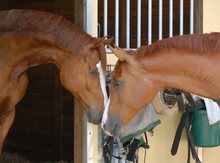An outbreak of acute respiratory disease occurred in several horses that attended the Far West Championship Horse Show held at the Deschutes County Fairgrounds in Redmond, OR recently.

Horses going nose to nose - A no-no in case of contagious diseases
Owners of all affected horses have been instructed to self-quarantine their horses at home for two weeks, and have been asked to monitor their horses for fevers or other signs of infection.
The Oregon State University-Veterinary Diagnostic Lab test results were negative for Equine Herpes Virus-1 (EHV-1) and EHV-4 and positive for Influenza A. Veterinarians from the Bend Equine Medical Center provided veterinary oversight for the show. Further details regarding the outbreak can be found on their website and their Facebook page.
Disease signs in the affected horses included acute onset with fevers, coughing, nasal discharge, and lethargy. No horses demonstrated any neurological signs, and no horses have required hospitalization.
The Far West Horse Show management has been very cooperative in working with the show veterinarians in managing this issue. The majority of the weekend events were cancelled. There have been no state quarantines issued.
Owners of all affected horses have been instructed to self-quarantine their horses at home for two weeks, and owners of all horses that attended the show are asked to monitor their horses for fevers or other signs of infection.
Equine influenza is caused by the orthomyxovirus equine influenza A type 2 (A/equine 2) and is one of the most common infectious diseases of the respiratory tract of horses. Concerned horse owners are advised to contact their veterinarian if they have questions and for developing an appropriate prevention plan, including vaccination.
Since the season for horse travel and shows is here, horse owners should practice basic every day biosecurity to protect their horse(s) from being exposed to this virus as well as other highly contagious pathogens.
The best defense against this particular virus is stringent biosecurity. Biosecurity is simply the process of taking the necessary steps to prevent an infection and/or stop the spread of an infection. while biosecurity is always important, it is critical during times of outbreaks of diseases.
Although biosecurity practices can sometimes seem tedious and somewhat unnecessary, these steps break the cycle of the disease.
